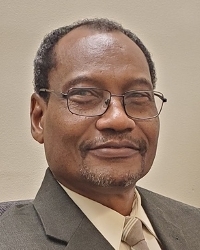Published in ConnectED Newsletter - Volume 6 - Issue 3 - March 2023
Dr. Leonard Lewis’ venture into the field of education began when he entered a teaching certificate program at the College of Education in his home country of Guyana. After graduating in 1973, he taught at the elementary level for about three years before transferring to a community high school for another two years. Both schools were in the small village of Belladrum, located on the west coast of Berbice. Shortly after, in the fall of 1980, Dr. Lewis immigrated to the United States to complete a B.S. degree in educational media at Ohio University. That was followed with an M.A. degree in educational media. Upon graduating, he began his foray into the US workforce at Dean Witter Reynolds and the MTA before returning to Ohio University to pursue a Ph.D. in instructional technology. At Ohio University, Dr. Lewis not only pursued his academic studies, he also engaged with a small group of students and faculty from the Caribbean region who were immersed in campus activities organized by the Caribbean Scholars Association. Whether opposing the invasion of Grenada or celebrating International Day festivities, the Caribbean Scholars Association made its mark on the campus. Not surprisingly, this area of interest led Dr. Lewis to write his dissertation, entitled “Caribbean immigrants in higher education: A study of the relationship among their learning styles and strategies, achievement motivation, and academic performance.” Students from several CUNY campuses were surveyed in this study.
In February of 1992, Dr. Lewis joined the City College School of Nursing as Director of its Learning Resource Center. When the School of Nursing closed in 1997, after the final batch of nursing students completed their program in Spring 1997, Dr. Lewis joined the School of Education as the Director of the Learning & Technology Resource Center (LTRC). The current space occupied by the LTRC originally housed part of the School Psychology program; it was remodeled to accommodate the newly designed LTRC, which marked its official opening on March 18, 1998. The LTRC was primarily designed to support students preparing for their certification examinations. At that time, performance on the teacher certification examinations across all CUNY campuses was at an all-time low. Over time, and with diligent support systems and careful monitoring of course work, student performance improved dramatically and eventually matched the passing rate at both the state and national levels.
Providing support for students preparing for their teacher certification examinations has held a special interest in Dr. Lewis’ academic career. In 2002, he secured a New York City Department of Education grant of $250,000 to offer programs to improve the performance of public school teachers on their teacher certification examinations. This was during the era when teachers were hired without being certified and later found themselves caught in a bind when the state mandated that all teachers obtain their initial certification to maintain their teaching positions.
Having served as both Chair and Co-chair of the Committee on Assessment, Dr. Lewis believes the School of Education has laid the foundation for continued success in its accreditation process. And while new challenges are being posed, the unit is making headway in implementing new changes necessary for responding to external demands that require compliance. Dr. Lewis says, “Every decade brings new challenges to education that necessitate a challenging response. However, I believe structures and systems are in place, and are being implemented, to support a successful accreditation visit.”
As the advisor to the School of Education undergraduate club, Teachers for a Better Tomorrow, Dr. Lewis has tremendous respect for those students who, despite tight schedules and daunting deadlines, make time and create opportunities for engaging beyond the classroom. “I remain committed to expanding opportunities for students to continue networking among themselves and upon graduating and entering the workforce. I look forward to the time when we recognize and value our students as ambassadors to the world.”
Last Updated: 03/31/2023 14:41
